How to Reduce Purines and Uric Acid
Generally, purine and uric acid levels can be reduced through dietary adjustments, increased water intake, regular exercise, smoking cessation and alcohol limitation, and medication interventions. A detailed analysis is as follows:

1. Dietary Adjustments
Reduce consumption of high-purine foods such as animal offal, seafood, and concentrated meat broths, as these foods produce significant amounts of uric acid after metabolism. Prioritize low-purine foods such as rice, wheat, vegetables, fruits, milk, and eggs, which contain low levels of purines and can reduce the raw materials for uric acid production.
2. Increase Water Intake
Drink 2000–3000 ml of water daily, preferably boiled water, light tea, or soda water. Sufficient hydration promotes uric acid excretion through the kidneys, lowers uric acid concentration in urine, and reduces urate crystal deposition. Avoid sugar-sweetened beverages, as the fructose they contain promotes uric acid production.
3. Regular Exercise
Select moderate-intensity aerobic activities such as brisk walking, swimming, or cycling, 3–5 times per week, 30 minutes per session, avoiding strenuous exercise. Obesity reduces the ability to excrete uric acid; controlling weight through exercise and diet can improve metabolic status and promote uric acid excretion.
4. Quit Smoking and Limit Alcohol Consumption
Smoking damages kidney function and decreases the efficiency of uric acid excretion. Alcohol metabolism produces lactic acid, which inhibits uric acid excretion, and beer itself contains high levels of purines. Complete smoking cessation is recommended, and strict alcohol abstinence is required during acute gout attacks.
5. Medication Intervention
If uric acid levels remain high after lifestyle modifications or if gout or kidney stones have already developed, uric acid-lowering medications such as febuxostat tablets or benzbromarone tablets should be used under a doctor's guidance. These medications help promote uric acid excretion and lower uric acid levels. Regular monitoring of liver and kidney function is necessary during treatment.
Reducing purine and uric acid should be based on lifestyle modifications. High-risk individuals may require medication treatment alongside regular monitoring of blood uric acid levels. If left uncontrolled, long-term hyperuricemia can damage the joints, kidneys, and cardiovascular system. Therefore, early intervention is essential to prevent complications.






